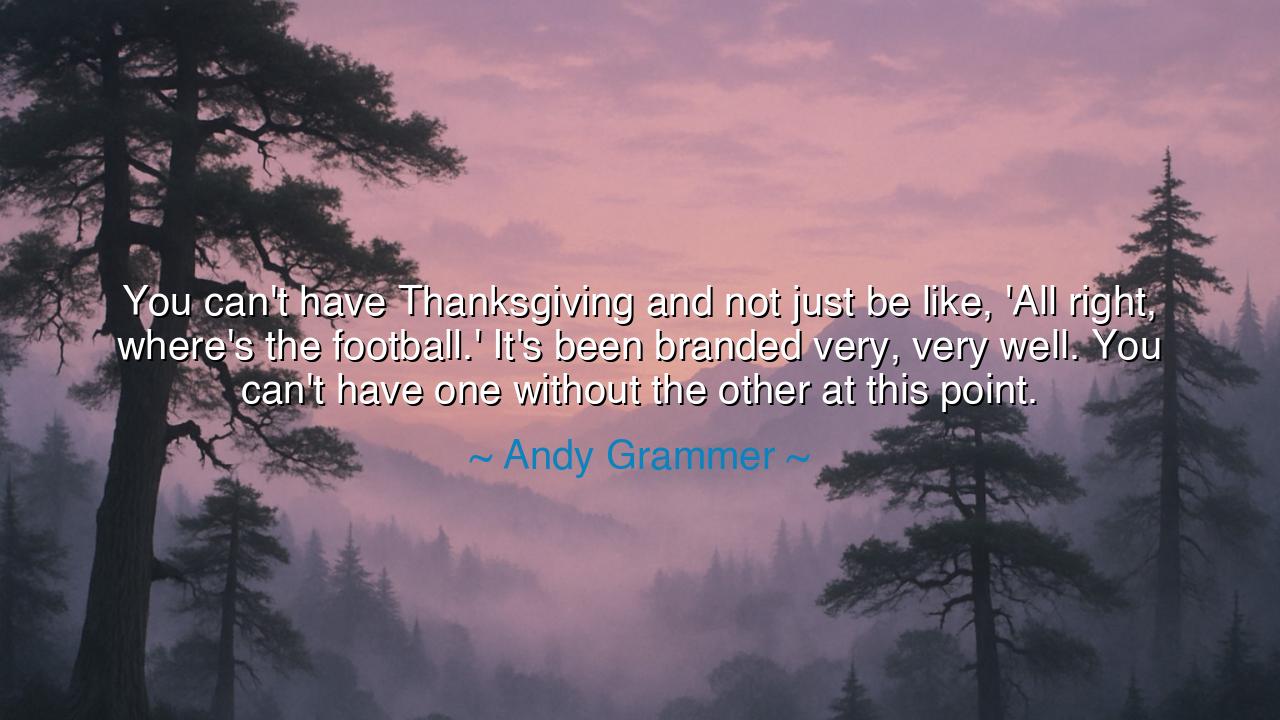
You can't have Thanksgiving and not just be like, 'All right
You can't have Thanksgiving and not just be like, 'All right, where's the football.' It's been branded very, very well. You can't have one without the other at this point.






Andy Grammer, in his spirited words—“You can't have Thanksgiving and not just be like, ‘All right, where's the football.’ It's been branded very, very well. You can't have one without the other at this point”—speaks of the way tradition and culture intertwine until they are inseparable. What began as a day of gratitude for harvest and family has, through time, become bound to the clash of teams upon the field. In this playful remark lies a profound truth: that human beings attach rituals to their celebrations, and in doing so, they give shape and rhythm to memory. Football has become, for many, not merely a sport, but a companion to Thanksgiving, a modern ritual layered atop an ancient feast.
The origin of this marriage between feast and sport lies in the late nineteenth and early twentieth centuries, when Thanksgiving Day football games became a beloved American pastime. College teams first took up the tradition, with Yale and Princeton, Michigan and Chicago, playing on the holiday. Later, professional teams adopted it, and by the time the Detroit Lions began hosting Thanksgiving games in 1934, the link was sealed. Broadcasters carried these matches into every home, and over the decades, football became part of the Thanksgiving table, as expected as turkey or pumpkin pie.
History offers parallels. The Romans, after feasts and sacrifices, would turn to the games of the Colosseum, blending celebration with spectacle. In medieval Europe, village festivals often ended with contests of strength, wrestling, or jousting. In each age, the people found that physical contest intensified the spirit of community, providing both entertainment and a stage upon which honor could be displayed. Football on Thanksgiving continues this ancient pattern—celebration followed by contest, gratitude mingled with excitement.
There is also a deeper meaning. For some, football on Thanksgiving is not merely about sport, but about continuity. Families gather not only to share a meal but also to share in the tradition of cheering, debating, and watching together. The game becomes a binding thread, a common language across generations. Grandparents recall famous plays of decades past; children witness heroes of the present. In this way, football is not just entertainment—it is a ritual of connection, a way for families to weave themselves into the larger fabric of national tradition.
Consider the story of the Detroit Lions’ first televised Thanksgiving game. It was the height of the Great Depression, and families who could not afford large feasts still found themselves united around the radio, and later the television, to share in something bigger than themselves. Though their tables may have lacked abundance, the roar of the crowd and the spirit of competition gave them a sense of belonging, hope, and national pride. In such moments, we see how a simple sport can transcend itself, becoming symbolic of resilience and unity.
The lesson here is twofold. First, that traditions evolve, and new elements—like football—can join old rituals without replacing their core meaning. Gratitude, family, and remembrance remain central to Thanksgiving, but the game has become a symbol of joy layered onto that foundation. Second, we are reminded that traditions hold power when they bring people together. Whether it is sport, song, or story, whatever binds hearts across generations should be cherished as part of the feast.
Practical wisdom follows: when you gather for Thanksgiving, let not football distract you from gratitude, but let it enhance your bonds. Watch together, laugh together, tell stories as the game unfolds. If football is not your family’s tradition, create your own—perhaps a walk, a board game, or a shared song. The point is not the activity itself, but the ritual of togetherness. By linking joy to gratitude, you will strengthen the roots of your family tree.
Thus, Andy Grammer’s playful words carry the weight of an ancient truth: that holidays are made richer when layered with ritual, that sport and feast together speak to both body and spirit, and that the true victory lies not on the field, but in the unity of hearts. Let this wisdom endure, and may every feast you share be strengthened by traditions that bind, uplift, and give joy across the generations.






AAdministratorAdministrator
Welcome, honored guests. Please leave a comment, we will respond soon